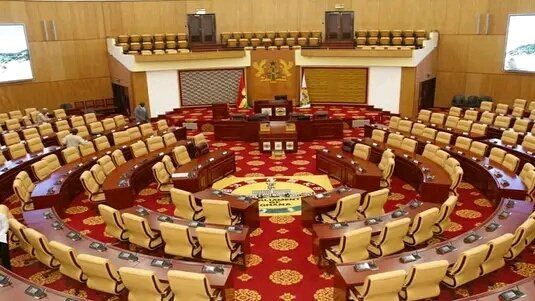Editorial
Parliament Passes Landmark Narcotics Bill: Cannabis Cultivation for Industrial Use Now Permissible

Parliament house of Ghana
Dear Editor,
Parliament has created a history by enacting a ground-breaking drug law that permits the growth and cultivation of cannabis for commercial use. With supporters emphasising the possible economic benefits and opponents raising concerns about potential ramifications, this action represents a fundamental shift in the nation’s approach to drug policy.
An important turning point has been reached in Ghana’s legislative history with the passage of the bill. The new law allows for the supervised production and processing of cannabis for industrial purposes, including uses in agriculture, textiles, and medicine. The bill’s backers contend that it creates employment prospects, opens up new economic options, and has the potential to position Ghana as a regional leader in cannabis-related companies.
Kwame Ampofo, an entrepreneur with a deep interest in the potential of the cannabis market, is one person who vehemently supports the legislation. “This Parliamentary decision is a progressive step towards releasing the economic potential of cannabis,” he emphasised. It would not only bring in money for the nation but also give our young people job chances.
However, there has also been opposition to the bill’s passage from people and groups worried about the possible dangers of cannabis growing. One such opponent is renowned psychiatrist Dr. Abena Appiah, who worries about the possible effects on public health and safety. Dr. Appiah said, “While I understand the economic benefits that this bill’s proponents highlight, we must also consider the potential consequences, especially in terms of increased drug abuse and related mental health issues”, she said.
It is crucial to remember that the legislation that has been enacted places stringent restrictions and control on the production and processing of cannabis. The prohibition of unauthorised possession, sale, or recreational use is a major focus of the law, which also lays a lot of attention on making sure that cannabis cultivation is only done for industrial uses.
With the passage of this legislation, Ghana joins an increasing number of nations that are rethinking their policies toward cannabis. Ghana wants to tap into new revenue streams, strengthen its economy, and generate job opportunities within a legal and regulated framework by embracing the possibilities of industrial cannabis farming.
The measure, according to its supporters, offers a chance for scientific research and advancement into therapeutic cannabis in addition to the commercial advantages. Supporters argue that more research into cannabis’ therapeutic potential could result in improvements in healthcare and treatment choices for a range of illnesses.
Regulatory entities will be essential in ensuring compliance and that cannabis production is done responsibly and in accordance with the established rules as Ghana moves forward with implementing the new legislation.
The adoption of this anti-drug bill demonstrates Ghana’s dedication to investigating alternate strategies and changing views on drug policy. It symbolises a tremendous advancement in the nation’s pursuit of economic development and expansion while also igniting crucial discussions about public health and safety.
The recent passage of the narcotic bill by the Ghanaian Parliament is a watershed moment for the nation. Ghana’s move to legalise cannabis planting and growing for industrial use shows that the country is open to taking advantage of new business prospects. While advocates highlight the potential advantages, issues with public health and safety must also be taken into consideration. To maximise the advantages of this historic legislation as Ghana moves forward, a balance between economic growth and responsible regulation will be essential.
Beatrice Kumah
Ghana Institute of Journalism
Editorial
Concern over mentally ill persons roaming Kwame Nkrumah Circle Interchange
Dear Sir
I write to express my concern over the growing number of mentally ill individuals roaming the Kwame Nkrumah Circle Interchange in Accra.
This area, a vital transportation hub and commercial centre, has increasingly become home to several persons visibly suffering from mental health issues, often without adequate care or supervision.
This situation poses risks both to the affected individuals and the general public. Some of these individuals are exposed to traffic hazards, unsanitary conditions, and in some cases, hostile treatment from passersby.
There have also been reports of occasional erratic behaviour, which causes fear and discomfort among commuters and vendors.
Mental health is a public health issue, and these individuals deserve compassion, medical attention, and a safe environment.
I urge the Ministry of Health, the Accra Metropolitan Assembly, and relevant NGOs to collaborate on a sustainable solution including mental health outreach programmes, rehabilitation, and safe housing.
Kwame Nkrumah Circle should be a symbol of progress, not a place where the vulnerable are left to struggle. Let us act with urgency and humanity.
From John Boateng
Kwame Nkrumah Circle
Editorial
Parents should encourage their wards writing BECE
Dear Editor,
AS the 2025 Basic Education Certificate Examination (BECE) takes off across the country starting Wednesday, I write to encourage all candidates taking part in this important step in their academic journey.
Out of a total of 603,328 candidates taking the examination this year, 306,078 are females, whiles the rest 297,250 are males.
Over the years, the examination begins on Monday and ended on Friday but per the timetable, this year’s candidates started on Wednesday and will end next week.
The BECE is not just an exam, it is a milestone from one stage to another. It represents years of hardwork, dedication and the dreams of countless students who hope to continue their education and build a brighter future.
This is where the role of parents, teachers and society become beneficial. Let us offer not only academic support but emotional encouragement to them.
I also appeal to educational authorities to ensure fairness, proper supervision and transparency throughout the examination period.
The journey may be challenging, but with time, focus and discipline they can make it.
I wish to use this platform to wish all of them well.
Naa Koshie, Teshie






